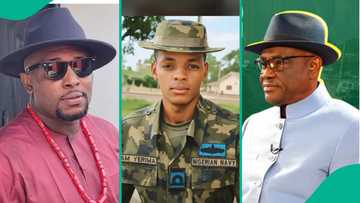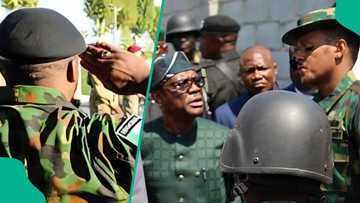Wike vs Yerima: List of 4 People With Power to Command a Military Officer on Duty in Nigeria
- Military officers on duty are legally bound to obey only orders from authorised authorities in Nigeria
- Orders from individuals outside this chain of command, including ministers not legally empowered over the military, have no binding effect
- Analysts explained that only 4 people in Nigeria have the power to give a command to a military officer while on duty
Abuja, Nigeria - Since the recent altercation between the Minister of the Federal Capital Territory (FCT), Nyesom Wike, and some military officers guarding a construction site in Abuja, Nigerians have been debating questions raised about the legal provisions on the issuance of orders and obedience among security personnel.
This confrontation followed the minister and his team’s attempt to access the area guarded by the military, leading to an exchange of words between both sides.

Source: Twitter
In the video, Wike was seen ordering soldiers to move aside to allow him and his delegation to enter the restricted area. However, the military officers, led by a young naval officer named Lt. AM Yerima, insisted they were acting on superior orders and would not permit anyone to violate them.
How military officers take command
Retired Navy Captain Umar Bakori explained that the military operates under the same system globally, built on strict hierarchy, discipline, and absolute obedience to orders from top to bottom without question.
Speaking to the BBC, Capt. Bakori noted that within this structure, loyalty and respect are maintained even among officers who joined the service at the same time, as ranks and roles clearly define authority.
He further explained that under military law, there are specific individuals whose directives every officer must obey while on duty, including:
President - Commander-in-Chief
Navy Captain Bakori stated that, according to the provisions of the Constitution and military law, the President — even as a civilian — serves as the Commander-in-Chief of the Nigerian Armed Forces.
Therefore, he has the authority to issue orders to all military officers, and such orders must be obeyed at all times and in all places.

Read also
Catholic priest points what naval officer did rightly during his altercation with Nyesom Wike
The superior Officer:
After the president, the only person whose orders a soldier is legally obligated to obey is his superior.
Navy Captain Bakori said:
"According to military law, whoever is superior to you in rank will give you orders, and you must obey him directly."
He said, In the military, when a superior gives an order, it must be carried out without hesitation.
"Even if a senior officer later realises there is a problem with that order, he cannot cancel it directly but can only advise the original issuer to withdraw or amend it.” He added.
Minister of Defence:
There are times when the Minister of Defence can give orders to military officers, and they obey him directly.
However, Capt. Bakori said,
"It is written in the constitution that the President is the head of the National Security Council, but the Minister is his representative. So in this situation, he can give orders and be obeyed."
Acting President:
The retired naval officer further explained that the law empowers an acting president to issue directives to military officers, and such orders must be obeyed.
He emphasised that, aside from the President and the acting President, no other individual has the legal authority to command military officers and expect compliance.

Source: Twitter
So why didn’t the soldiers obey Wike?
Navy Captain Umar Bakori explained that the officer refused to obey the order given to him by the Minister of FCT because he was not among those whom the law required him to obey.
He said, "The law that defines the people to whom a military officer must obey does not include the FCT minister, so the order he gave has no effect on the military leader and the junior officers who are with him at this time."
Captain Bakori explained that in such situations, military officers are bound to follow only the orders they were originally given. Any soldier who issues an order outside their authority and refuses to comply faces severe consequences.

Read also
"Common sense should tell you": Man shares what gave military officer morale to confront Wike
He added that in the military system, subordinates cannot be given orders they are unable to execute, and anyone found guilty of such a breach may be punished for negligence, insubordination, or violating military regulations.
US-based Professor Kperogi drops 3 powerful thoughts
Earlier, Legit.ng reported that US-based scholar Prof. Farooq Kperogi has shared a thought-provoking analysis of the viral confrontation between FCT Minister Nyesom Wike and Naval officer Yerima.
Kperogi said the officer embodied calm courage, describing him as the immovable object who finally stopped Wike’s unstoppable force.
The professor also tackled Nigeria’s culture of reverse ageism, saying older leaders often hide behind age when logic fails.
Source: Legit.ng




